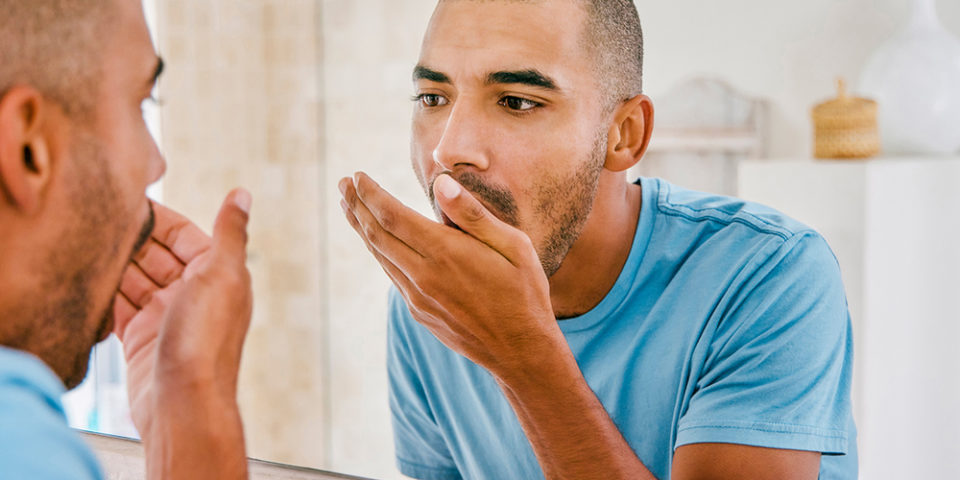What causes bad breath – and how it can be prevented
Pretty much everyone has experienced halitosis, or bad breath, once or twice – there’s a reason ‘morning breath’ is a common joke in television shows and movies. If your struggle with bad breath is ongoing, you may wonder how to fix it for good. David Hicklin, DMD, explained what causes bad breath and what steps you can take to prevent it in the future.
What causes bad breath?
“Causes of halitosis can be immediate or acute, or they can be chronic or ongoing,” said Dr. Hicklin. “While immediate causes are usually easier to treat, they may recur.”
One of the most common causes of bad breath is simply not brushing enough, or not brushing very well. When you don’t brush and floss thoroughly, food particles remain in the mouth, collecting around the base of your teeth, gums and on your tongue. An unpleasant odor and taste in the mouth will result. This goes for dentures, too, which need to be cleaned consistently or they can collect bacteria, food particles or even fungi.
Another common cause is certain foods, like garlic or onions. Some strong flavors can leave a taste in the mouth and scent your breath.
Longer-term causes of bad breath include periodontal disease, also known as gum disease. Halitosis is one of the main and most well-known symptoms of this disease, along with causing an unpleasant taste in the mouth.
A decrease in saliva production, also known as dry mouth, can cause bad breath, too, by lessening your body’s natural ability to remove debris and food particles. Dry mouth can be caused by salivary gland disorders or by continued breathing through the mouth and not the nose.
Health conditions like diabetes, respiratory infections, chronic bronchitis, postnasal drip, oral cancer, a liver or kidney disorder, gastrointestinal disorder or a chronic sinus infection can all cause dry mouth or bad breath.
Finally, use of tobacco products, including cigarettes, cigars, smokeless tobacco and snuff all stain the teeth, leave a foul smell around you and heighten your risk for developing the conditions responsible for causing halitosis.
How to prevent bad breath
“The goal for treatment is to slow, halt and finally prevent the process,” said Dr. Hicklin. “If you use tobacco products, now is the perfect time to quit! Not only will your breath freshen, but you may also find yourself with an improved sense of smell and taste afterward, too.”
For halitosis caused by diseases or other medical conditions, bad breath can be prevented by treating the disease or condition itself.
The best first step to preventing bad breath before it starts? Brush your teeth!
Brush twice a day, morning and night, and after meals as well. This will help to keep your teeth clean and your mouth free of unpleasant bacteria.
One trick to make it easier to regularly brush is to buy a travel-sized toothbrush-and-toothpaste kit, plus mouthwash, and keep it in your desk, vehicle or bag at work. That way, it’s easy to duck into the bathroom after lunch and spend a couple of minutes cleaning your teeth. If you don’t have time to brush your teeth well, you may still be able to swish around some mouthwash. It’s not perfect, but it helps.
Make sure you’re brushing for long enough, too. A quick swipe over the teeth will help, but it won’t get all the food particles that might be left behind. Brush for about two minutes at a time. Mouthwash should be gargled and swished around your mouth for about thirty seconds.
To prevent bad breath longer-term, schedule a check-up and cleaning with your dentist. The cleaner your teeth and tongue are, the better your breath will be.
Find a doctor
Whether you’re looking for a primary care physician or need to see a specialist, we’re here to help with experienced, compassionate care near you.
Find a Doctor

